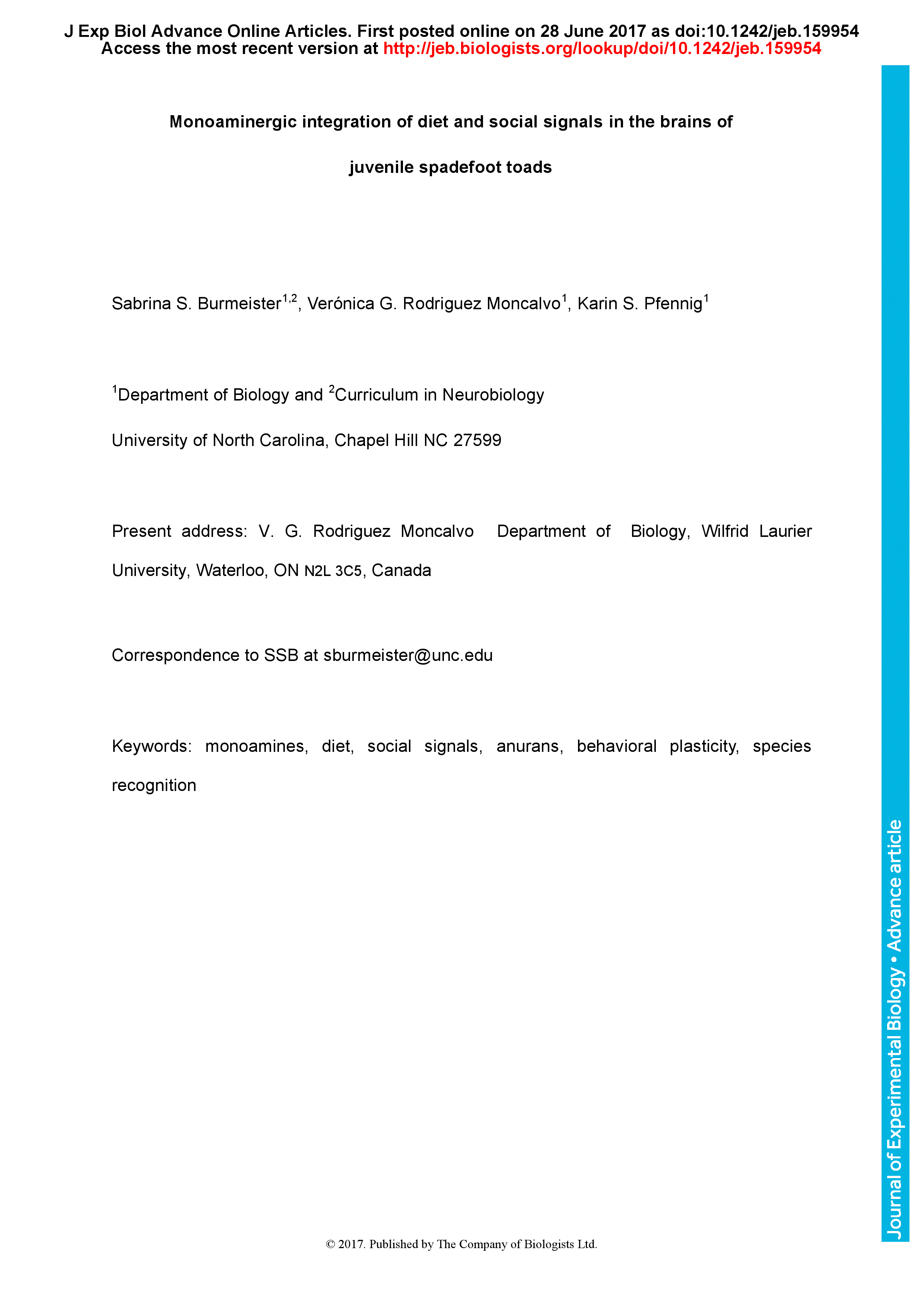Social behavior often includes the production of species-specific signals (e.g., mating calls or visual displays) that evoke context-dependent behavioral responses from conspecifics. Monoamines are important neuromodulators that have been implicated in context-dependent social behavior yet we know little about development of the monoaminergic systems and whether they mediate the effects of early life experiences on adult behavior. We examined the effects of diet and social signals on monoamines early in development in the Plains spadefoot toad (Spea bombifrons), a species in which diet affects the developmental emergence of species recognition and body condition affects the expression of adult mating preferences. To do so, we manipulated the diet of juveniles for six weeks following metamorphosis and collected their brains 40 minutes following the presentation of either a conspecific or heterospecific call. We measured levels of monoamines and their metabolites using high pressure liquid chromatography from tissue punches of the auditory midbrain (i.e., torus semicircularis), hypothalamus, and preoptic area. We found that call type affected dopamine and norepinephrine signaling in the auditory midbrain and that diet affected dopamine and serotonin in the hypothalamus. In the preoptic area, we detected an interaction between diet and call type, indicating that diet modulates how the preoptic area integrates social information. Our results suggest that the responsiveness of monoamine systems varies across the brain and highlight preoptic dopamine and norepinephrine as candidates for mediating effects of early diet experience on later expression of social preferences.
Monoaminergic integration of diet and social signals in the brains of juvenile spadefoot toads
Present address: V. G. Rodriguez Moncalvo Department of Biology, Wilfrid Laurier University, Waterloo, ON N2L 3C5, Canada
Currently Viewing Accepted Manuscript - Newer Version Available
- Split-screen
- Views Icon Views
- Open the PDF for in another window
-
Article Versions Icon
Versions
- Version of Record 01 September 2017
- Accepted Manuscript 01 January 2017
- Share Icon Share
-
Tools Icon
Tools
- Search Site
Sabrina S. Burmeister, Verónica G. Rodriguez Moncalvo, Karin S. Pfennig; Monoaminergic integration of diet and social signals in the brains of juvenile spadefoot toads. J Exp Biol 2017; jeb.159954. doi: https://doi.org/10.1242/jeb.159954
Download citation file:
Advertisement
2023 JEB Outstanding Paper Prize shortlist and winner

The JEB Editors are delighted to announce the shortlisted authors for the 2023 JEB Outstanding Paper Prize. Read the winning paper - Tiny spies: mosquito antennae are sensitive sensors for eavesdropping on frog calls - by Hoover Pantoja-Sanchez and Brian Leavell from Ximena Bernal's lab at Purdue University, USA.
JEB Science Communication Workshop for ECRs

If you’re an early-career researcher interested in science communication and are attending the SEB Annual Conference in Prague this summer, come a day early and join the JEB Editors at a sci comm workshop to learn the key writing skills needed to promote your research to a broad audience beyond your peers (1 July at 14.30-17.30). Places are limited to 24 attendees, and applicants should apply through the SEB registration page by 30 April 2024.
Bridging the gap between controlled conditions and natural habitats in understanding behaviour

Novel technologies enable behavioural experiments with non-model species, in naturalistic habitats and with underexplored behaviours. In their Commentary, Scholz and colleagues discuss how to obtain a deeper understanding of the natural ecology and lifestyle of study animals.
Beluga metabolic measures could help save species

To help save animals from extinction, it’s important to understand what each species needs to survive. This led Jason John et al. to measure the metabolic rates of captive belugas to develop a ‘fish calculator’ showing that the whales need to eat ~23 salmon per day.
ECR Workshop on Positive Peer Review

Are you an ECR looking for tips on how to write concise, astute and useful manuscript reviews? If so, join the JEB Editors at a 2-hour JEB-sponsored Workshop on Positive Peer Review at the Canadian Society of Zoologists annual meeting in Moncton on 9 May 2024 at 13.00-15.00. There are 25 spaces for ECRs and selection is first come, first serve. To sign up, check the ECR Workshop box when you register for the CSZ meeting.



